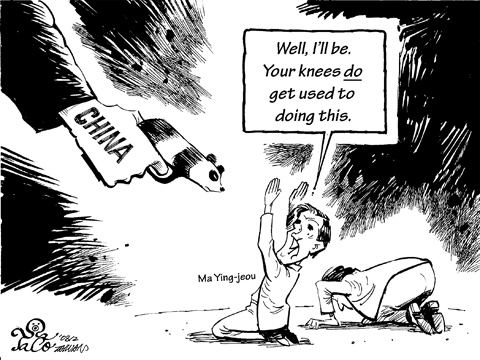
The clock
is ticking on Ma’s loose promises
By Huang Kuo-chang
黃國昌
Saturday, Dec 27, 2008, Page 8
“Building a democratic system is just the first step in protecting human rights.
If a democratically elected government does not accept monitoring or respect the
law, it may still act lawlessly and abuse its power, leading to discrimination
and confrontation. To build a normal democratic society, therefore, we have to
actively improve Taiwan’s politics, economy and human rights environment.
Otherwise, democracy will exist in name only. Neither illegal acts and abuses of
power by the government nor social inequality and injustice can be erased by the
fine-sounding word ‘democracy’ alone.”
This comes from President Ma Ying-jeou (馬英九) and Vice President Vincent Siew’s
(蕭萬長) human rights White Paper entitled “Taiwan Human Rights Declaration for the
New Century” (新世紀台灣人權宣言).
Few would dispute these words. The problem is, why does the declaration seem so
ironic today? “Operation Concord,” carried out on Ma’s orders to guarantee the
security of Chinese envoy Chen Yunlin (陳雲林) during his visit last month, has
become a byword for collective government abuse of power. The government has yet
to review and reflect on events during Chen’s visit.
Faced with accusations that separation of powers under the Constitution is being
upset by excessive centralization of power, the government has responded with
cold arrogance, paying no attention to the problem.
Ma promised to amend the Assembly and Parade Act (集會遊行法), changing the permit
system to a notification system to give the streets back to the public. In
practice, however, he has used the police to deny the public its constitutional
right to parade and assemble.
In response to calls from the Wild Strawberry Student Movement and other civic
groups for amendments to this law, the Cabinet proposed an amendment that would
change the law’s form but not its content; the proposed notification system
would be compulsory, not voluntary.
Ma also said that party, political and military forces would cease exercising
influence within the media, but now his administration is wantonly interfering
in the Central News Agency and Radio Taiwan International. Ma even stood by as
some of his Chinese Nationalist Party’s (KMT) legislators pushed through an
absurd resolution forcing the Public Television Service to secure item-by-item
budgetary approval from higher authorities.
Ma said that prosecutors and investigators should strengthen their understanding
of human rights protection. But in answering criticism from his former professor
at Harvard University on the criminal detention system and human rights issues,
Ma struck a different note, claiming that there were no such violations.
Ma has also said every citizen has the right to transparent information, but
after the Ministry of Foreign Affairs received a report from the US government
on the US nationality status of Taiwanese legislators, Ma allowed Minister of
Foreign Affairs Francisco Ou (歐鴻鍊) to refuse to reveal the contents in an effort
to cover up for at least one lawmaker who deceived the public.
This powerful leader is someone who says one thing before a presidential
election but does another after it. Under today’s constitutional system and
given the political reality, the public cannot reverse this situation straight
away. And those who dare to protest are ridiculed as victims of their own deeds.
Ma must keep his promises and reflect on how he has departed from them. If he
cannot, the discontent and anger simmering in civil society — now reflected in
low approval ratings — will break out in a new wave of collective action.
Huang Kuo-chang is an assistant
research fellow at the Preparatory Office of the Institutum Iurisprudentiae at
Academia Sinica.